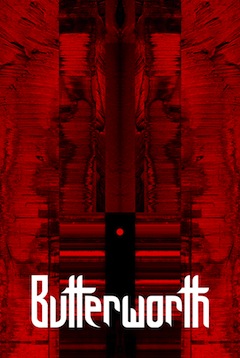Michael Butterworth started writing short fiction in 1966 for the British science-fiction magazine New Worlds when its editor was Michael Moorcock. He was one of the younger exponents of that New Wave of science fiction, as the movement became known, and he continued contributing to New Worlds until the editions most closely associated with Moorcock came to an end in 1979. Now he has two new books out that collect the fiction of those early years which he had thought “lost for good.”


Butterworth writes in an email: “From a background of SF I was under the thrall of Burroughs, the Girodias and City Lights ‘readers’ (collections), writers like Jarry, Ballard, Rabelais, Poe and others, and so I fitted in perfectly with Michael’s intention to turn New Worlds into the mouthpiece for a more literary kind of science fiction then emerging.”
While Butterworth and My Servant the Wind collect his work from that era for the first time, they also include new material such as “Spunkee-do!” and “Coldly as They Flicker” (in Butterworth), and a contemporary short novel based on his 1971 writing notebooks (in My Servant the Wind). “The main lesson I learned from Burroughs was the way he collaged texts,” Butterworth says, confirming Burroughs scholar William Weiss‘s claim that Butterworth owes “every piece of fiction he has ever published” to that lesson.
Until the appearance of these books, Butterworth says, he thought his earlier writing had been lost for good. But “thanks to a number of people, in particular Gareth Jackson, artist, filmmaker (“Lord Horror: The Dark and Silver Age”) and sometime publisher, who has made them available, beautifully designed and illustrated, under his NULL23 imprint.”
Gareth’s cover blurb for Butterworth reads:
NULL23 presents the collected short works of the author Michael Butterworth. Previously found in long out of print anthology paperbacks and yellowing magazines such as NEW WORLDS and other offshoots submerged by the accumulation of time—fictions speculative that have been mostly lost and overshadowed by his later ‘Ecker’ infamy as the co-publisher of the Northern provocateurs SAVOY BOOKS.
“These works are often located in a post-atomic wasteland of haunted deserts, conjoined with a dislocated Manchester of memory—being speculative fictions with veins of autobiography. The page becomes a structural space in which narrative is dismembered and arranged. Place becomes uncertain and hallucination is explored with thoughtful rigour. Neither of the future nor of then, these are works that occupy an era but conversely exist outside of any catalogued time.
Butterworth collects these early texts that are supplemented by contemporary works – charting the output of an author from his late teenage years to the man of 2018 in a book that maps the investigative experiments in literature by an author who dared perpetually to differ.
And his blurb for My Servant the Wind reads:
Navigating his story, there is nothing linear, autobiography becomes speculative fiction. In alien contacts the geography of the page disintegrates and time has become uncertain—located neither here nor there. The wind is blowing from the future deserts which he remembers from his youth. He is haunted by himself and memories of the apocalypse. He has travelled through new worlds and wild turbulence, protracted labour—a difficult birth. The wind blows a novel against his receiver and he transcribes . . .


It’s a treat to see my old friend Michael’s work getting renewed attention. My own influence on him deserves some credit – I encouraged him to get a job as a copywriter in the glamorous business of advertising. Needless to say, he fucked off out of that in short order and became a partner in England’s most notorious and multiply-prosecuted publishing company. It’s also high time that the experimental literary daring of New Worlds Magazine (under Moorcock’s direction) is remembered and rescued from being some sub-genre of Science Fiction.
How come you connected with all them innaresting ones?
I should be asking you that.
just luck in my case. what’s your excuse?